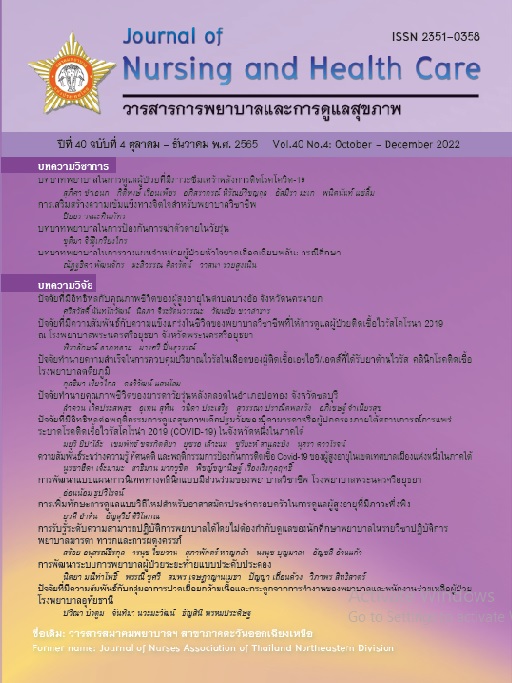บทบาทพยาบาลในการดูแลผู้ป่วยที่มีภาวะซึมเศร้าหลังการติดโรคโควิด-19
คำสำคัญ:
บทบาทพยาบาล, ภาวะซึมเศร้า, ผู้ป่วยหลังติดโรคโควิด-19บทคัดย่อ
สถานการณ์ปัญหาทั่วโลกจากการแพร่ระบาดของโรคโควิด-19 นอกจากส่งผลต่อสุขภาพร่างกายแล้ว ยังส่งผลกระทบต่อสุขภาพจิตของประชาชน ผลกระทบด้านสุขภาพจิตที่เกิดขึ้นจากการระบาดของโรคโควิด-19 พบอัตราภาวะโรคซึมเศร้าสูงขึ้นถึง 3 เท่าในช่วงที่มีการระบาดของโรคโควิด-19 บทความนี้มีวัตถุประสงค์เพื่อนำเสนอ อาการ การค้นหาผู้ป่วยเชิงรุก การคัดกรอง และบทบาทพยาบาลในการดูแลภาวะซึมเศร้าในผู้ป่วยหลังติดโรคโควิด-19 ซึ่งการดูแลรักษาภาวะซึมเศร้าในผู้ป่วยหลังติดโรคโควิด-19 พยาบาลถือว่าเป็นผู้ที่มีบทบาทสําคัญ จึงต้องมีความรู้ในแนวปฏิบัติการพยาบาล และมาตรฐานการพยาบาลผู้ป่วยภาวะซึมเศร้า รวมทั้งมีการฝึกฝนและพัฒนาความรู้ให้ทันสมัยอยู่เสมอ และให้ความรู้ข้อมูลต่างๆ ที่เกี่ยวข้องกับการรักษา ให้คำปรึกษากับผู้ป่วยและญาติ เพื่อจะได้ช่วยให้ผู้ป่วยมีสุขภาพจิตและสุขภาพกายที่ดีขึ้น และสามารถกลับไปใช้ชีวิตในสังคมได้อย่างมีความสุขต่อไป
Downloads
เอกสารอ้างอิง
Rattanabankit O. Mental health impact of the emerging epidemic crisis (COVID-19. Office of Academic Affairs, Secretariat of the Senate. 2021; 11(29): 1-12. (in Thai)
Department of Health. Report on the Covid-19 situation around the world. [Internet]. 2021 [cited 2022 Mar 04]. Available from: https://covid19. anamai.moph.go.th/en/ (in Thai)
HDC Database. Access to services for patients with depression, fiscal year 2022 [internet]. 2022 [cited 2022 May 08]. Available from: https:// thaidepression.com/www/report/main_report/pdf/ ahb-03-22-mix_HDC.pdf (in Thai)
Department of Mental Health. Stress-depressed during the covid epidemic Mental health problems that need to be addressed [Internet]. 2021 [cited 2022 Mar 04]. Available from: https://www.dmh. go.th/news-dmh/view.asp?id=30819 (in Thai)
Pfefferbaum B, North CS. Mental health and the Covid-19 pandemic. N. Engl. J. Med. 2020; 383(6): 510-2.
Salari N, Hosseinian-Far A, Jalali R, Vaisi-Raygani A, Rasoulpoor S, Mohammadi M, Khaledi-Paveh B. Prevalence of stress, anxiety, depression among the general population during the COVID-19 pandemic: a systematic review and meta-analysis. Glob. Health. 2020; 16(1): 1-11.
Labrague L, Ballad CA. Lockdown fatigue among college students during the COVID- 19 pandemic: Predictive role of personal resilience, coping behaviors, and health. Perspect Psychiatr Care. [internet]. 2020 [cited 2022 Oct 01]. Available from: https://www.medrxiv.org/content/10.1101/2020.10. 18.20213942v1.full.pdf+html
Szczesniak D, Ciulkowicz M, Maciaszek J, Misiak B, Luc D, Wieczorek T, Witecka KF, Rymaszewska J. Psychopathological responses and face mask restrictions during the COVID-19 outbreak: Results from a nationwide survey. Brain Behav. 2020; 87: 161–2.
Bartoszek A, Walkowiak D, Bartoszek A, Kardas G. Mental well-being (depression, loneliness, insomnia, daily life fatigue) during COVID-19 related home-confinement—A study from Poland. Int J Environ Res Public Health. 2020; 17(20): 1-12.
Buneviciene I, Bunevicius R, Bagdonas S, Bunevicius A. COVID-19 media fatigue: predictors of decreasing interest and avoidance of COVID- 19-related new [internet]. 2021 [cited 2022 Oct 01]. Available from: https://www.sciencedirect.com/ science/article/pii/S0033350621002109
Brooks SK, Webster RK, Smith LE, Woodland L, Wessely S, Greenberg N, Rubin GJ. The psychological impact of quarantine and how to reduce it: rapid review of the evidence. The lancet. 2020; 395(10227): 912-20.
Sawangsri W, Hasitawet N, Yamma C, Rattanatai N, Jungsirakulwit D. Prevalence of perceived stress, depression and related factors among COVID-19 patients in Bangkok. Journal of Mental Health of Thailand. 2021; 29(2): 114-24. (in Thai)
Division of Mental Health Services Administration. Guidelines for treating depression in post-COVID-19 patients [internet]. 2022 [cited 2022 May 18]. Available from: http://mhso.dmh.go.th/page/subject_details. php?subject_id=641 (in Thai)
Tantiphaswasin C. Long COVID. Chonburi Hospital Journal. 2022; 47(1):.1-2. (in Thai)
Ekwarangkul S. Know, understand, take care of depression. Bangkok: Chulalongkorn University Press; 2010. (in Thai)
Department of Mental Health, Ministry of Public Health. Guidelines for using mental health tools for for public health personnel in community hospitals (Chronic Disease Clinic) Revised Edition. Nonthaburi: Agricultural Cooperative Association of Thailand Printing House; 2015. (in Thai)
Mazza MG, Zanardi R, Palladini M, et al. Rapid response to selective serotonin reuptake inhibitors in post-COVID depression. Eur Neuropsychophar¬macol. 2022; 54: 1-6
Chaiudomsom K, Phaholapak P, Wattanavikkit P, Abhisitpinyo S. Psychiatry (2nd Edition). Khon Kaen: Print Klang Nana Wittaya; 2017. (in Thai)
Chanapan N. Patients with major depressive disorder: nurses’Role in promoting for patients’ self-care. Journal of Nursing Science Chulalongkorn University. 2020; 32(1): 75-88. (in Thai)
Chaiwannawat T, Kitiyawan S. Nurse and the operation of community mental - health and psychiatry. The Journal of Psychiatric Nursing and Mental Health. 2019; 33(2): 1-12. (in Thai)
Insuranee P, Saengpak C, Hemụnchu S. Nursing careof Adolescentwith Depression. Nursing Public Health and Education Journal. 2017; 18(2): 14-27. (in Thai)
ดาวน์โหลด
เผยแพร่แล้ว
รูปแบบการอ้างอิง
ฉบับ
ประเภทบทความ
สัญญาอนุญาต
ลิขสิทธิ์ (c) 2022 วารสารการพยาบาลและการดูแลสุขภาพ

อนุญาตภายใต้เงื่อนไข Creative Commons Attribution-NonCommercial-NoDerivatives 4.0 International License.



